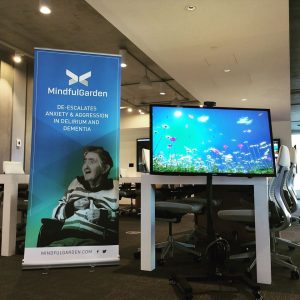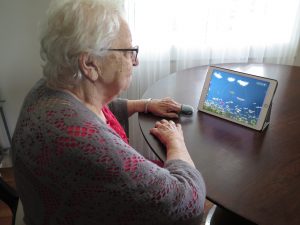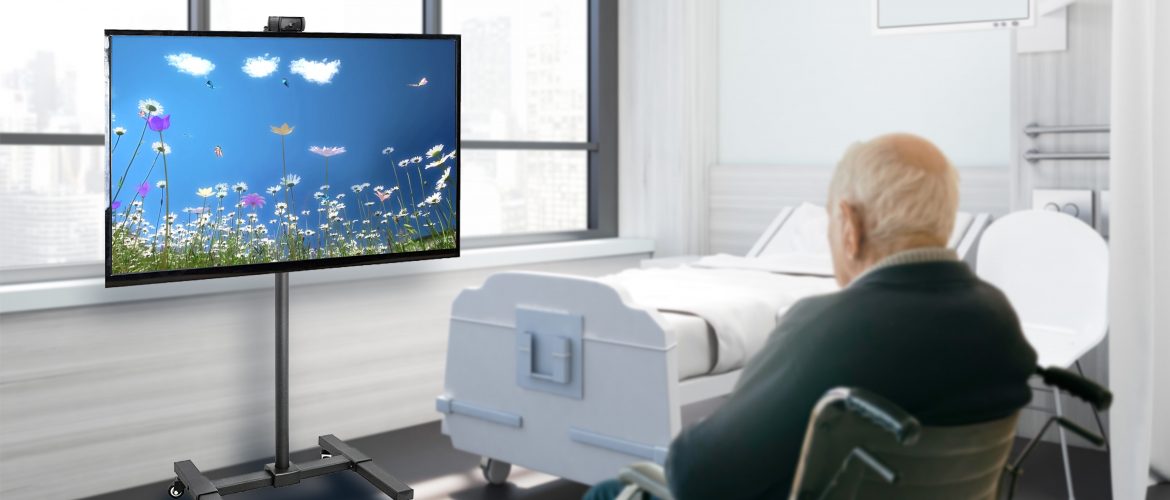A typical MindfulGarden session begins with scenes of clear blue skies and butterflies floating peacefully through fields of white coneflowers and purple lilies. The aim? An alternative approach to dementia care that focuses on compassion, dignity, and empathy.
MindfulGarden is a unique digital experience that de-escalates agitation among people living with dementia in hospitals and long-term care settings. Founder and CEO, Catherine Winckler, was inspired to create the platform alongside co-founder, Mark Ross, when her own mother passed away from undiagnosed delirium and overuse of restraints and psychotropic drugs in 2000[i]. Since then, Winckler has fought hard to preserve her mother’s legacy through the creation of MindfulGarden.
“MindfulGarden began as an exploration on how to use digital technology to ‘interrupt’ hyperactive delirium behaviours in the highly vulnerable population of frail elderly patients in hospital,” Winckler says in her blog. “These are patients who, like my mother, could go downhill quickly post-surgery or on admittance to the hospital with urgent underlying conditions.”
Today, caregivers use MindfulGarden more widely to reduce agitation and psychotropic drug use, and to promote a more positive journey back to health.
A Patient-Powered Solution

The MindfulGarden Digital Platform
Up to 90% of people living with dementia are affected by behavioral and psychological symptoms[ii] such as agitation and aggression, which can be caused by changes in environment, misperceived threats, or disruptions in routines. Medication is traditionally used to address these symptoms.
Yet, significant evidence suggests that non-pharmaceutical interventions may be a gentler and more effective tool for arresting negative mood and behaviour changes in dementia patients.[iii]
Cue MindfulGarden – a digital solution that not only reduces the need for medication, but also calms patients enough for their caregivers to investigate what may be causing the agitation in the first place.
MindfulGarden responds to each patient’s individual distress level. When someone exhibits distress cues in their voice, heart rate or gestures, MindfulGarden reacts by displaying soothing images, such as iridescent butterflies and blooming flowers, which helps to redirect their anxiety. The higher the anxiety level, the more responsive the images on screen become.
Ross believes the digital platform is effective because it works without being invasive or forcing patients to interact with it. “Most people at a heightened sense of anxiety are not in the frame of mind to be told how to relax,” he adds. “We strip all that down and create a calming experience, one that is reacting to what’s going on in the body.”
MindfulGarden Provides an Alternative to Behavioral Management Medication

After years of creating immersive interactive environments for major organizations, such as the Olympics, Winckler and Ross were invited by their local health authority to leverage their technology as a resource for caregivers. The Centre for Aging + Brain Health Innovation, powered by Baycrest (CABHI), helped the company make the switch from entertainment to healthcare by brokering a relationship with Good Samaritan Delta View Care Centre. Here, they validated their platform’s effectiveness as an alternative tool for traditional de-escalation methods requiring medication.
Shahida Devji, a retired assistant site manager at the Good Samaritan Delta View Care Centre, and previous onsite project lead for MindfulGarden, says the platform helped her staff strengthen their commitment to a “hugs not drugs” policy.
“At the Good Samaritan Delta View Care Centre, we always try to exhaust our options before going down the route of medication,” says Devji. “When we tried MindfulGarden with our patients, it gave us goosebumps. It’s such an amazing tool that visually calms your head and your mind.”
Dementia Care for the Future
In today’s changing health care climate, it’s even more critical for caregivers to manage their patients’ responsive behaviours and potential to cause self-harm or harm to staff. That’s why Ross and Winckler are working to get their solution into the hands of those who need it the most. They are working with local health care providers to launch MindfulGarden on tablets and provide training to caregivers as part of their immediate COVID-19 response plan.
As for the future of MindfulGarden? It will continue to represent Esther Winckler’s legacy. The team remains committed to developing health care technology that enhances quality of care and preserves patient dignity. As they bring their product to market, we will see the broader impact of this solution, one that benefits people living with dementia, and those who care for them the most.
Watch this video to learn more about MindfulGarden:
[ii] https://www.ncbi.nlm.nih.gov/pmc/articles/PMC3345875/
[iii] https://www.health.harvard.edu/blog/whats-the-best-way-to-manage-agitation-related-to-dementia-2020021418816


